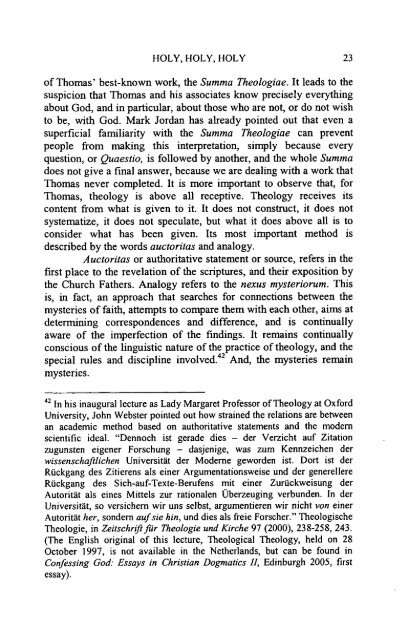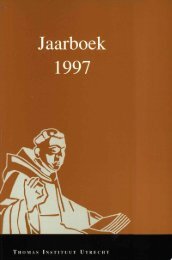Jaarboek Thomas Instituut 2006 - Thomas Instituut te Utrecht
Jaarboek Thomas Instituut 2006 - Thomas Instituut te Utrecht
Jaarboek Thomas Instituut 2006 - Thomas Instituut te Utrecht
You also want an ePaper? Increase the reach of your titles
YUMPU automatically turns print PDFs into web optimized ePapers that Google loves.
HOLY, HOLY, HOLY 23<br />
of <strong>Thomas</strong>' best-known work, the Summa Theologiae. It leads to the<br />
suspicion that <strong>Thomas</strong> and his associa<strong>te</strong>s know precisely everything<br />
about God, and in particular, about those who are not, or do not wish<br />
to be, with God. Mark Jordan has already poin<strong>te</strong>d out that even a<br />
superficial familiarity with the Summa Theologiae can prevent<br />
people from making this in<strong>te</strong>rpretation, simply because every<br />
question, or Quaestio, is followed by another, and the whole Summa<br />
does not give a final answer, because we are dealing with a work that<br />
<strong>Thomas</strong> never comple<strong>te</strong>d. It is more important to observe that, for<br />
<strong>Thomas</strong>, theology is above all receptive. Theology receives its<br />
con<strong>te</strong>nt from what is given to it. It does not construct, it does not<br />
sys<strong>te</strong>matize, it does not specula<strong>te</strong>, but what it does above all is to<br />
consider what has been given. Its most important method is<br />
described by the words auctoritas and analogy.<br />
Auctoritas or authoritative sta<strong>te</strong>ment or source, refers in the<br />
first place to the revelation of the scriptures, and their exposition by<br />
the Church Fathers. Analogy refers to the nexus mys<strong>te</strong>riorum. This<br />
is, in fact, an approach that searches for connections between the<br />
mys<strong>te</strong>ries of faith, at<strong>te</strong>mpts to compare them with each other, aims at<br />
de<strong>te</strong>rmining correspondences and difference, and is continually<br />
aware of the imperfection of the findings. It remains continually<br />
conscious of the linguistic nature of the practice of theology, and the<br />
special rules and discipline involved.42 And, the mys<strong>te</strong>ries remain<br />
mys<strong>te</strong>ries.<br />
42 In his inaugurallectureas LadyMargaretProfessorof Theologyat Oxford<br />
University,John Webs<strong>te</strong>rpoin<strong>te</strong>dout howstrainedthe relationsarebetween<br />
an academic method based on authoritativesta<strong>te</strong>mentsand the modem<br />
scientific ideal. "Dennoch ist gerade dies - der Verzicht auf Zitation<br />
zuguns<strong>te</strong>n eigener Forschung - dasjenige, was zum Kennzeichen der<br />
wissenschaft/ichen Universität der Moderne geworden ist. Dort ist der<br />
Rückgang des Zitierensals einer Argumentationsweiseund der generellere<br />
Rückgang des Sich-auf-Tex<strong>te</strong>-Berufensmit einer Zurückweisung der<br />
Autoritätals eines Mit<strong>te</strong>ls zur rationalenÜberzeugingverbunden.In der<br />
Universität,so versichemwir uns selbst,argumentierenwir nicht van einer<br />
Autoritäther, sondernauf sie hin, unddiesals freieForscher."Theologische<br />
Theologie,in Zeitschrift for Theologie und Kirche 97 (2000),238-258,243.<br />
(The English original of this lecture, TheologicalTheology,held on 28<br />
October 1997, is not available in the Netherlands,but can be found in<br />
Confessing God: Essays in Christian Dogmatics II, Edinburgh2005, first<br />
essay).








